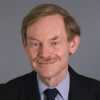Robert Zoellick

Robert Zoellick
Robert Bruce Zoellickis an American banker who was the eleventh president of the World Bank, a position he held from July 1, 2007 to June 30, 2012. He was previously a managing director of Goldman Sachs, United States Deputy Secretary of Stateand U.S. Trade Representative, from February 7, 2001 until February 22, 2005. Zoellick has been a senior fellow at his alma mater Harvard Kennedy School since retirement from the World Bank in July 1, 2012...
NationalityAmerican
ProfessionPolitician
Date of Birth25 July 1953
CityNaperville, IL
CountryUnited States of America
We are going to have to give these people a chance to get back on their feet.
You have to regain the (peace) momentum by getting people to respect the cease-fire, come up with a coherent negotiating position and when the negotiations resume on November 20, to get the rebels as well as the government ... to make more progress toward a peace accord,
The U.S. presence, both in security and economic terms, is a daily fact of life as people saw on December 26 (when the U.S. mobilized its military to provide aid to tsunami victims). We have many ways in which we interact with the region,
The United States will not welcome corrupt people to our country,
I will be emphasizing that the leaders who engage in corruption and their associates will have no place with the United States.
It is a very fluid situation ... the process of SLM coherence is proceeding.
The American steel industry faces a turning point. We believe the actions the president is taking today can restore the strength and profitability of this very important American industry.
We are too interconnected to try to hold China at arm's length, ... It is time to take our policy beyond opening doors to China's membership into the international system, we need to urge China to become a responsible stakeholder in that system.
We are too interconnected to try to hold China at arm's length, hoping to promote other powers in Asia at its expense.
It is clearly the case that programs in Europe and the United States that have increased biofuel production have contributed to the added demand for food.
Great upheavals produce shock waves that widen cracks in political, economic, and security orders. Sometimes the old orders break. Yet it can be in the power of leaders and peoples to shape the directions of change.
An empowered public is the foundation for a stronger society, more effective government, and a more successful state.
It is much harder for economies to prosper if they cannot sell to, buy from, invest with, and even transit their neighbors. Landlocked countries with failed or failing neighbors can lose access to the world economy.
Since I came to the World Bank in 2007, I have argued that we must 'modernize multilateralism.'